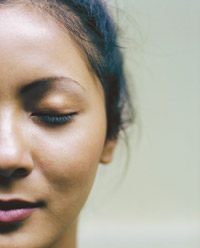Taking care of your body and mind during the holiday season
by Pat Sullivan and Pavitra Marita Ehses
This article was originally published in December 2005

(December 2005) — During this time of celebration, we look forward to making connections with family and friends, yet we all know that too often we end up overextended and exhausted. Instead of enjoying family and daily activities, we may realize we are actually in a state of coping. Too much to do and unresolved worrying causes us stress and compromises our health.
The problem with stress is that it produces adrenal hormones and other chemicals that repress the immune system, reduce digestion, increase heart rate and blood pressure; all to preserve energy and activate the “fight or flight” mechanism.
This system was brilliantly designed for handling acute situations (such as running from a tiger), but it was not meant to be activated continually as it may be in our busy and often stressful modern lifestyles.
In a low-level chronic state, stress causes susceptibility to seasonal viruses and infections, digestive disorders, headaches, insomnia, aches and pains and other health issues, which if not addressed can lead to more serious disease states.
Since avoiding all stress is difficult, here are some simple ways to support our body and mind during these times:
One is as simple as breathing, which is a natural, built-in, self-regulating healing mechanism. During the breath cycle the body scans itself, looking for disruptions and areas in need of repair. For instance, when we have pain, we tend not to breathe fully because it hurts. If you can breathe into and move past the discomfort, you’ll be sending regenerating and healing energy to the part of the body that needs it most.
Another simple and important thing is to drink enough water. From a cellular point of view, the transmission of nutrients through the cell wall is conducted by water. Water is vital in energy production in the cells, metabolism, emotional synthesis, lymph circulation and neurotransmission.
Hydration is also one of the most important factors in our aging process. Unfortunately, we see many people who are dehydrated despite drinking a sufficient amount of water and who may even complain of fluid retention. It’s not always about how much you drink but how well the body is utilizing it. Underlying factors limiting the absorption of water, however, can be resolved.
When things get too far out of balance, the body becomes unable to self regulate effectively and we get sick.
So what is good health? Our perspective is that it is the ability to adapt constantly to all factors in our environment on all levels: body, mind and spirit. It is well known that emotional and psychological stress produce a physical state conducive to illness and disease. At that point, some of the body’s systems already have broken down and are not working as nature intended.
You can compare this process to the circuit breakers going off in your house when the electrical system gets overloaded. When this happens in the body, we need the equivalent of flipping those breakers back on to get everything flowing again. When we do this for our body, we find it has an incredible ability to start healing itself.
Many ancient modalities such as acupuncture, qi gong, ayurveda and yoga, are based on the understanding of the importance of balancing the body and mind for optimal health. In more recent years, western medical science has also realized the important connection of the energy systems of the body to our health.
James Oschman, Ph.D, author of “Energy Medicine, The Scientific Basis,” recently stated: “Energetic approaches can have a major impact in this time of crisis in the healthcare system by providing a sound basis for cost-effective integrative practices. Energy is the currency of all interactions in nature. To leave energetic considerations out of the equations of life and medicine is to ignore 99 percent of what is happening.
“We are just beginning to map the energetic pathways in the body. We just need a way to communicate with these electronic circuits, to turn on the right switches and harness the body’s ability to heal spontaneously. Energetic approaches work quickly and with few side effects. This is the medicine of the future.”
As practitioners, we utilize the wisdom of many healing modalities, working together in a unique system that allows the body of the client to choose the most appropriate, beneficial technique for his or her specific situation. Each symptom can have many different causes.
We ask your body’s innate wisdom to guide us through the use of neuro-muscular biofeedback, similar to that used in applied kinesiology. This precise feedback, generated by your own body, allows us to discern the nature of your health issues and the most useful treatment for you.
We balance the underlying conditions by addressing all the factors behind the disorder that enable the disease to be there, and when we do that, the symptoms often disappear without the use of drugs or invasive means. This holistic approach takes into account the physical, emotional, mental aspects, environmental influences and unresolved past experiences.
As a layperson, you can learn five simple techniques to help your family bring about significant improvements with everyday health challenges. These techniques were piloted in a Chicago inner-city school, Sanders Academy, over the summer of 2005. The program’s results were so positive, it was implemented for the entire student body this fall. The school experienced an increase in their students’ learning abilities, a decrease in behavioral problems, improved social interactions, and generally happier, healthier kids.
Remembering to treat yourself well and listening to your body will go a long way towards relieving stress, keeping your perspective and having a joyful season.
Pavitra Marita Ehses and Pat Sullivan are certified BodyTalk practitioners at the Evergreen Center for Integrative Medicine. Contact them at 206-729-0907 or, for more information, see www.bodytalkwashington.com
